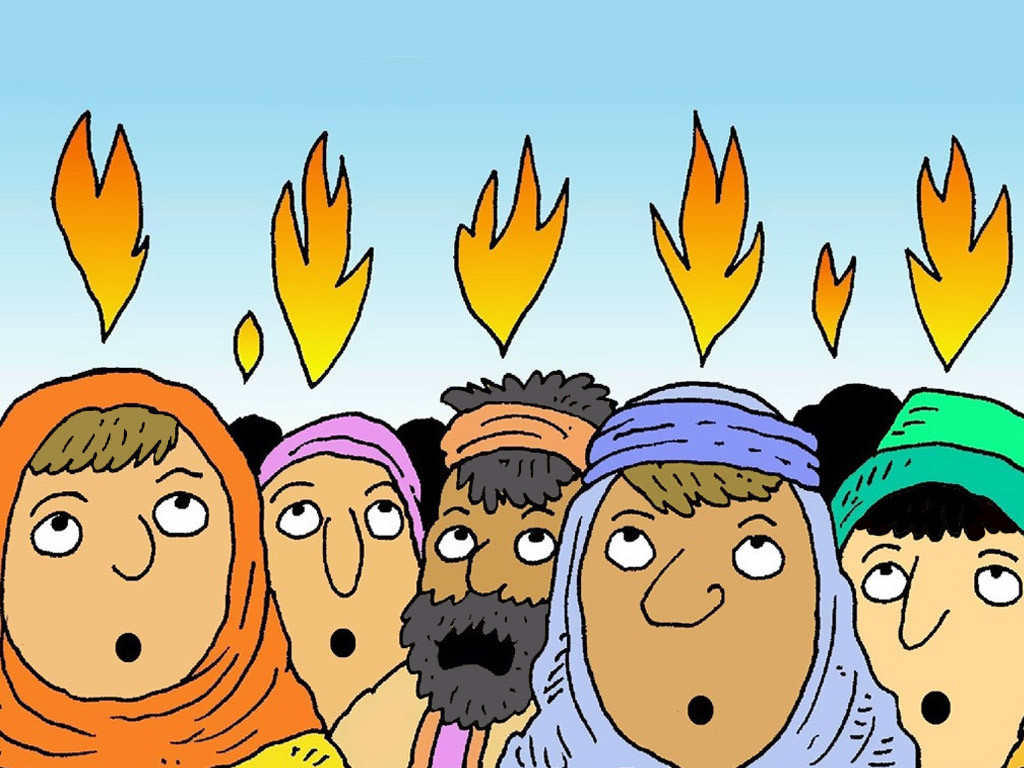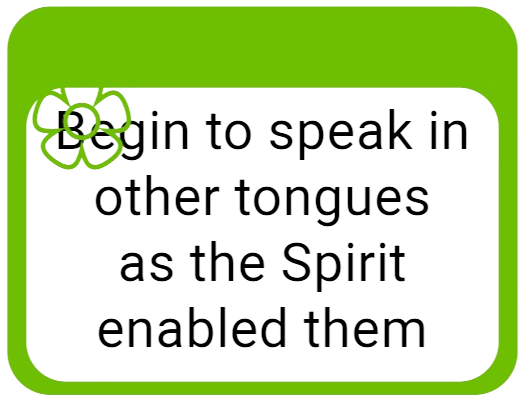Let sentences connect!
All of them were filled with the Holy Spirit and began to speak in other tongues as the Spirit enabled them. – Acts 2:4
Fifty days after Jesus had passed away, the disciples were gathered together praying. At that time, the Holy Spirit descended upon them, and they began to speak in languages they had never learned before. Could this be considered a reintegration of the languages that had been divided since the Tower of Babel incident?
A passage that seems to have prophesied the event of the Holy Spirit descending is recorded in Joel, which is the 29th book in the order of the Old Testament.
And afterward, I will pour out my Spirit on all people. Your sons and daughters will prophesy[1], your old men will dream dreams, your young men will see visions. – Joel 2:28
The Acts of the Apostles records the activities of the early disciples after Jesus’ death. Following the above event, Jesus’ disciples began to preach the gospel beyond the ethnic limitations of being Jewish, to Romans, Egyptians, and Arabs among others. Despite severe persecution, Christianity became the state religion of Rome by the Edict of Milan in 313 AD under Emperor Constantine, and eventually became the religion of Europe and the world.

In the previous chapter, we looked at how to connect sentences in a way that allows clauses to function as nouns. Now, let’s organize adverbial clauses that express “where?”, “why?”, “how?”, and “when?”. Adverbial clauses are ultimately adverbs. Moreover, adverbial clauses can be easily formed by placing the conjunctions listed below at the very beginning of the clause. The following is a list of conjunctions that lead adverbial clauses, arranged according to our <word order> sequence.
| 5W1H | Conjunctions | |
| Where | place | where, wherever |
| Why | causes | because, since, as |
| How | manner | as |
| result | so, that∼may (=in order that∼may), lest∼should(=for fear∼should), so∼that, such∼that, so that | |
| When | Time | when, while, as, before, after, till (=until), since, as soon as |
Table of Contents
S+V+(Who+What)+(Where+Why+How+When)
- Where
Go to the village, where you will find a donkey tied there and a colt with her.
2. Why
The kingdom of God does not come with your careful observation, nor will people say, ‘Here it is,’ or ‘There it is,’ because the kingdom of God is within you.” – Luke 17:20-21)
3. How
His heart was not fully devoted to the LORD his God, as the heart of David his forefather had been. -1 Kings 15:3)
As I have loved you, so you must love one another. – John 13:34)
God so loved the world that he gave his one and only Son. -John 3:16)
The God of hope may fill you with all joy and peace as you trust in him, so that you may overflow with hope by the power of the Holy Spirit. – Romans 15:13)
4. When
While we were still sinners, Christ died for us.
As Solomon grew old, his wives turned his heart after other gods, and his heart was not fully devoted to the LORD his God, as the heart of David his father had been. -1 Kings 11:4)
As soon as you find him, report to me. – Matthew 2:8)
Thirty days have passed since I was called to go to the king. -Esther 4:11)
Only hold on to what you have until I come. – Revelation 2:25)
By the time the sun is hot tomorrow, you will be delivered. -1 Samuel 11:9)
You yourself will disown me three times before the rooster crows twice. – Mark 14:30)
Conjunctive Adverbs
In addition to conjunctions there are words that, although not conjunctions, serve to connect sentences as adverbs. These words, including conjunctive adverbs found in grammar books, help to express relationships between sentences more smoothly.
Such adverbs include But, however, nevertheless, nonetheless, yet, still, and for indicating results: accordingly, consequently, hence, so, therefore, thus, as a consequence, as a result, and for adding explanations or changing topics: further, furthermore, moreover, above all, meantime, meanwhile, by the way, etc.
For example, “yet” is used in the sense of “but,” meaning “however,” but “but” is used when acknowledging only one of two contrasting facts, while “yet,” as in the following biblical passage, is used to acknowledge both sides despite a contrast, often emphasizing what follows after “yet.”
Sorrowful, yet always rejoicing; poor, yet making many rich; having nothing, and yet possessing everything. – 2 Corinthians 6:10


답글 남기기